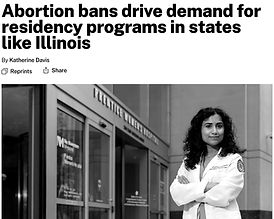top of page
Crain's Chicago Business
Nestled on a leafy street and surrounded by multifamily buildings, a former hotel in Oak Park provides shelter for patients of Cook County Health with nowhere to go after receiving medical treatment. The Recuperation in a Supportive Environment Center, or RISE Center, came about during the early days of the COVID-19 pandemic, when Cook County Health was seeking ways to shelter homeless residents sick with the virus.
bottom of page





































